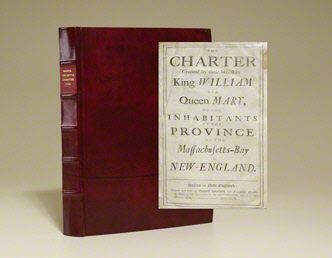
“AN INSISTENCE THAT THE COLONIES HAD ‘RIGHTS… INHERENT RIGHTS, NOT A GIFT FROM A HIGHER AUTHORITY”
(MASSACHUSETTS ACTS AND LAWS). The Charter Granted by Their Majesties King William and Queen Mary to the Inhabitants of the Province of the Massachusetts-Bay in New-England. WITH: Acts and Laws of His Majesty's Province of the Massachusetts-Bay in New-England. Boston: Samuel Kneeland and Timothy Green, 1742. Folio, modern full dark red calf, raised bands. $4800.
Scarce colonial printing of the charter and laws within the Massachusetts Bay province, one of the earliest and subsequently most rebellious of British colonies. Handsomely bound.
"Considerable mystery surrounds the grant of the charter to the Massachusetts Bay Company in 1629. The enemies of the colony later insisted that it was gotten surreptitiously, and there are some grounds for suspecting that bribery was involved. In any event… its charter was that of a trading company much like that given to the Virginia Company in 1612… Despite legislation and the multiplication of administrative agencies and offices, the colonies were never brought under effective control for any length of time. After 1660, Massachusetts provided a center of resistance… Other colonies likewise opposed efforts at control, but none in this period were so strenuous as Massachusetts… [and] the Massachusetts Bay charter of 1629 was vacated in 1684. The Dominion of New England wiped out the legislatures of the New England colonies and substituted for them a royal governor and council who were given the power to rule without consulting the inhabitants… When Massachusetts got a new charter in 1691, the colony's independence was limited by the addition of a royal governor and royal officials… While, in the strictest sense, no government could exist in the colonies without a grant from the Crown, there did exist in the colonies from the start a concept and a practice which assumed that there was a more basic foundation of society and government than that offered by grants from higher authority… As the colonies grew, there was ever more evidence of growing self-consciousness and of an insistence that the colonies had 'rights' … Implicit in these is the assumption that the 'rights' of Englishmen are inherent rights, not a gift from higher authority" (Jensen, 61-64, 234,184).
In addition to representing America's course toward independence, this is an early and scarce imprint with fascinating insights into colonial and British concerns, including relations with Indians, "Free Negroes," laws on taxing and the regulation of militia, as well as those concerning prisons, trials, tradesmen, piracy, sexuality, "misspending money in taverns," adultery, polygamy and many other topics. Copies of the Acts vary in collation, since after each legislative session additional laws were printed and paged continuously with the expectation that they would be bound with the original work. A complete copy can contain anywhere from 333 to more than 550 pages. Here, the final pages-335-337-"contain the last session of the General Court of 1742-43" (Tower 262). The Charter usually appears at the beginning of the 1742 printing, as in this copy; though the Charter and Laws are separate books, they are almost always bound together. Evans 5002; 5003. Tower 262. Sabin 45568; 45673. Babbitt, Hand-List of Legislative Sessions, 193-4. Benedict, Acts and Laws, 151-66. Faint owner signatures to final leaf.